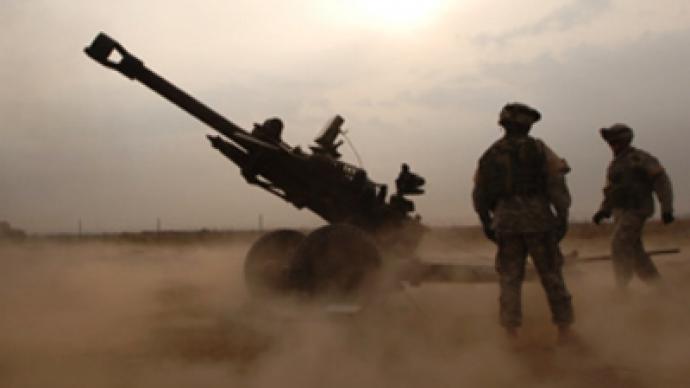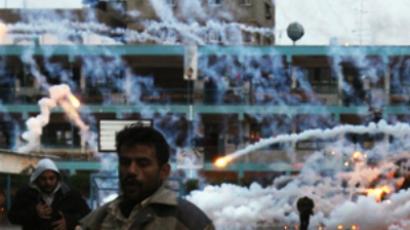U.S. Military Targets: Next Stop – Sudan

The plans of the new U.S. administration to put diplomacy ahead of military solutions in its foreign policy is all over the world media.
There may be exceptions: the war in Afghanistan is going to intensify. In Somalia, there will be a fight with the pirates. And then there is Sudan.
Very little is said these days about this conflict zone with a prospective U.S. military angle.
However, just a few months ago, when Barack Obama was still busy with his electoral campaign and George Bush, in the spare time from his own campaigning, kept carrying the burdens of power, the signs of attention – articles, documentaries and news reports on Sudan – started appearing in the world media.
It is strange how there hadn’t been all that much information about the African country before. It is strange how abruptly the flow of information stopped in early December, after it was established that the Ukrainian battle tanks onboard the freighter Faina, captured by the Somali pirates, may have been intended for Sudan.
In the pre-New Year blast of data and opinions on Sudan, which somehow fizzled out by mid-December, there was a lot of emphasis put on the warrant of arrest, expected to be issued by the International Criminal Court, for the President of Sudan Omar Al-Bashir, who has been in office for the past nineteen years. For the last three years he has been at the helm of a coalition government composed of his supporters in a fair proportion with his former civil war enemies from the South.
Amazingly, when the warrant came out in January, the world media hardly noticed it at all.
Even if I suggest that the Great Spin Machine stopped for a long Christmas holiday, what was that other mechanism, the Mean Green Machine of the U.S. military, planning or doing about Sudan? The only piece of information available, and pure hearsay at that, is the story that when the mediators proposed, on behalf of the owners of the vessel, to unload the cargo of tanks from the pirate-held ‘Faina,’ the U.S. Navy threatened to sink the vessel.
The Russian press (Kommersant, 12.12.2008) hinted that the battle tanks on the ‘Faina’ may have been paid for by the U.S. and intended for the use by the militant groups in the South of Sudan which America is allegedly going to turn into something like Afghanistan’s Northern Alliance. That may or may not be true. The fact is, the civil war of the Sudanese South against the Sudanese North ended three years ago on a very pleasant note for the South. It was agreed that in 2011 there will be a referendum which will decide if the South stays with Sudan or becomes an independent nation.
For the South Sudanese, therefore, there is no direct interest in going to war again. However, they consider themselves ‘cousins’ of the new U.S. president, because Barack Obama’s father belongs to a tribe that used to live in the South of Sudan and moved to Kenya only recently. Maybe that could have become a reason enough for some armed groups in the South of Sudan to accept the role of an arrowhead in a future American operation?
But what is going to be the target? The long civil war was for the oil wells in South Sudan and the untapped resources of Darfur, an area the size of France covering the western parts of both Sudanese North and partly – South. The oil stays with the South if it secedes from Sudan, so it’s just a matter of a couple of years before the international community can start developing oil deposits to international standards – and receive an additional source of fuel for its needs.
With Darfur the situation is different. It remains Sudanese and inherits from the South its role of natural opposition to the government of Omar Al-Bashir, simultaneously holding most of the country’s natural resources which are so far at the complete disposal of the central government in Khartoum. But – there is a catch: the resources stay undisturbed by anyone, because there is an ongoing war in Darfur, a war between the Arabs of the North united in a government-sponsored militia, and the Africans of Darfur, and a great many living in refugee camps after their villages have been burned down.
The war in Darfur is a cruel and violent African conflict, with rape always accompanying murder. It is one of those conflicts that never fail to cause a strong emotional reaction in those who learn the details. Then again, it’s one of those ethnic conflicts about which the international community usually can do next to nothing. Except this time things may turn out to be different, but that war has many faces.
To Khartoum it is a clash of two ethnic groups which, since 2003 when it started, has killed over 10,000 people. To the U.S. Congress it’s a case of genocide, with 300,000 victims. The UN or any other international organization hasn’t named it genocide so far but the 300,000 figure comes from UN aid workers and NGO members hired for fact finding missions by various UN bodies. The International Criminal Court definitely sees genocide there if it issues an arrest warrant on these grounds for the incumbent president of an independent nation.
Sudan is the biggest country in Africa, and it is also a place where two worlds meet: the Arab world and the African world. The Arabs populate the North, the Africans (a multitude of tribes and ethnic groups) live in the South – and many Southerners displaced by the civil war live in camps in the North and in Darfur. In Darfur the population is both Arab and African. Historically, it is hard to expect lasting peace between ethnic groups totally different in everything from skin colour to religion and culture, and the history of Sudan confirms that.
It is also hard to imagine, again from the point of view of history, that a certain mechanism of co-existence would not emerge from the time these ethnic groups have lived side by side. It does exist, for if it didn’t, there would be no end to the civil war, and it would not have ended in such a satisfactory way for the both sides. The South enjoys a wide autonomy and is getting ready for the referendum of 2011, while the North gets an equal share in oil income.
So, may there be ways to solve the Darfur problem as well? In the UN opinions differ. In the United States and in the International Criminal court they do not. Days after the U.S. election a Democratic think tank, which included many veterans of the Clinton administration, issued a letter of advice to then President-elect Barack Obama in which, in the chapter devoted to foreign policy, the next president was urged to fight genocide in the world by all possible means. There was also a notion in the letter that the U.S. must not neglect the problems of Africa.
Officials of the Khartoum government routinely call the efforts of the International Criminal court against president Al-Bashir part of an American plot against Sudan. Taking into consideration all the above, it may not be just domestic propaganda. At the very least, it is clear that the arrest warrant issued for the Sudanese president on the grounds of suspected masterminding genocide and ethnic cleansing in his country, can be a perfect pretext for an invasion and ‘regime change.’
As in Darfur, where the genocide is allegedly happening, there is no such African ethnic force that could become an ally of the U.S. against the government in Khartoum. It is logical for the U.S. to turn to the only strong non-government (and formerly anti-government) force that exists in the country: the Sudan People’s Liberation Movement which represents most of the Southern armed groups that fought in the civil war. They can easily become a ‘Northern Alliance’ or, to be geographically correct, the ‘Southern Alliance’ of Sudan.
The Southern armies are combat-ready and have experience of a war that lasted over 20 years. They may lack hardware, but that is not a problem for anyone who becomes a U.S. ally. They lack air support too, but that is not a problem either.
There’s a question I’d like to ask – would they be willing, after a mere three years of peace, to go back to war for U.S. interests? Their own interests are provided by the peace treaty signed with the North and by the very fact of the existence of the coalition government in Khartoum. In addition: does America, or anyone else, have the moral right to drag these people into yet another war when they are just getting the taste of the fruits of peace?
Maybe just one more: is it possible to try solving the Darfur problem by joint diplomatic and political efforts of the main power centers of the modern world? Could the U.S. – together with Russia, China, India, with UN permission – put enough pressure on Khartoum to find out, once and for all, the real picture of the events in Darfur, and to make the government of Sudan solve the issue?
Starting wars and changing regimes may be easier than that. Iraq and Afghanistan have shown that finishing a war is much harder than starting it.
Anyway, now it is the end of January and the Great Spin Machine seems to be as indifferent to Sudan as it was in the last week of 2008. Maybe things are changing?
Maybe the world economic crisis presented America with a choice: no two wars at a time, so is it Afghanistan or Sudan? America certainly answered ‘Afghanistan,’ because its interests there need daily protection, while an operation in Sudan would be more ideologically-based than implemented for the sake of straight national interest.
Maybe the Obama team means it when it speaks of diplomacy, not war, as the first echelon of foreign policy. Or maybe one day we will hear again about Sudan becoming a military target because of the human rights record of its president. If it happens, the spin will come first. Let’s look out for an avalanche of media information on Sudan – that will be the sign!
At this point, let me depart and apologize for telling you a story of a future war instead of a past one as promised.
Evgeny Belenkiy, RT.














